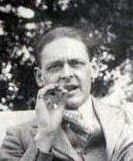The Waste Land and Other Poems by T.S. Eliot
Page 1 of 19 - 1 2 3 4 5 6 7 8 9 10 11 12 13 14 15 16 17 18 19 Purchase full notes for £5.95 (aprox $9.28)
To purchase, click on the link above and enter your payment details. You may purchase using Paypal or your credit/debit card. You do not have to provide your postal address if paying by Paypal, but an email address is required as a link will be sent automatically to your email account by return. Click on the link to download the PDF file. Please note that the link will expire after 48 hours. If you have any problems with your purchase, please do not hesitate to contact the webmaster at info@towernotes.co.uk
A free sample, text only, and drawn from the beginning and middle of the notes is provided below.
The Poems: The Love-Song of J. Alfred Prufrock, Portrait of a Lady, Preludes, Rhapsody on a Windy Night, The Waste Land, The Hollow Men, Journey of the Magi, A Song for Simeon, Animula, Marina
Introduction: The Invisible Poet
In his critical essay, Tradition and the Individual Talent (published 1917), T. S. Eliot describes the poet as engaged in a ‘continual surrender of himself… a continual self-sacrifice, a continual extinction of personality.’ He goes on to explain this more fully, in terms, rather bizarrely, of a chemical reaction between oxygen and sulphur dioxide:
The analogy [ used earlier in the essay ] was that of the catalyst. When the two gases previously mentioned are mixed in the presence of a filament of platinum, they form sulphurous acid. This combination takes place only if the platinum is present; nevertheless the newly formed acid contains no trace of platinum, and the platinum itself is apparently unaffected; has remained inert, neutral, and unchanged. The mind of the poet is the shred of platinum. It may partly or exclusively operate upon the experience of the man himself; but, the more perfect the artist, the more completely separate in him will be the man who suffers and the mind which creates; the more perfectly will the mind digest and transmute the passions which are its material.
 If you have found our critical notes helpful, why not try the first Tower Notes novel, a historical fantasy set in the time of the Anglo-Saxon invasions.
If you have found our critical notes helpful, why not try the first Tower Notes novel, a historical fantasy set in the time of the Anglo-Saxon invasions.
Available HERE where you can read the opening chapters.
